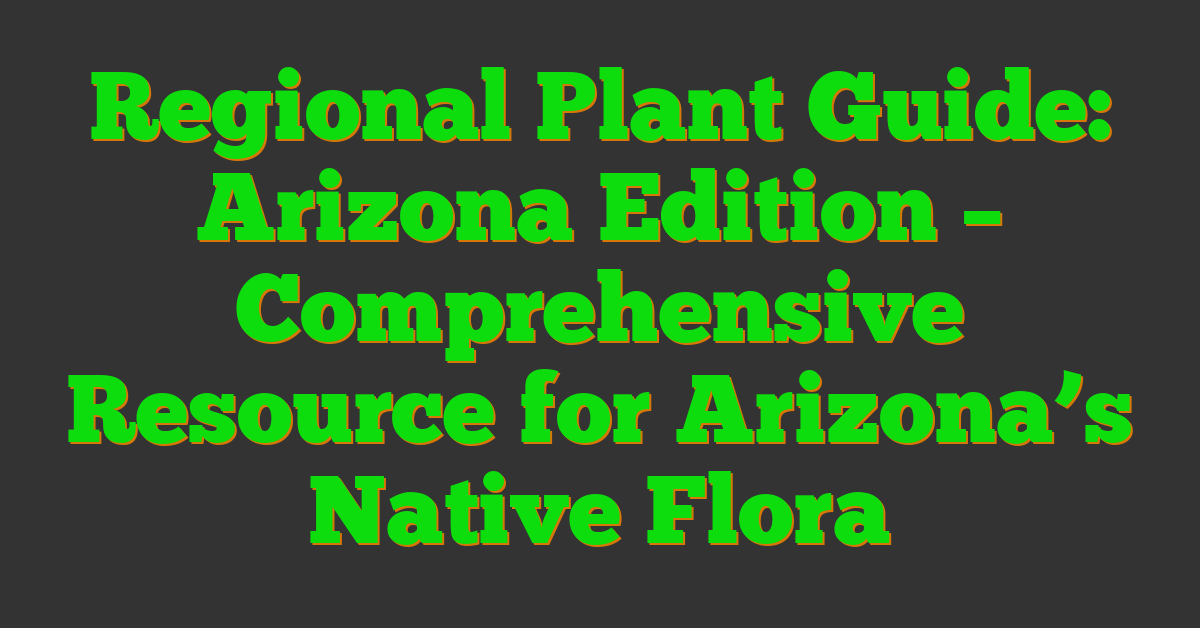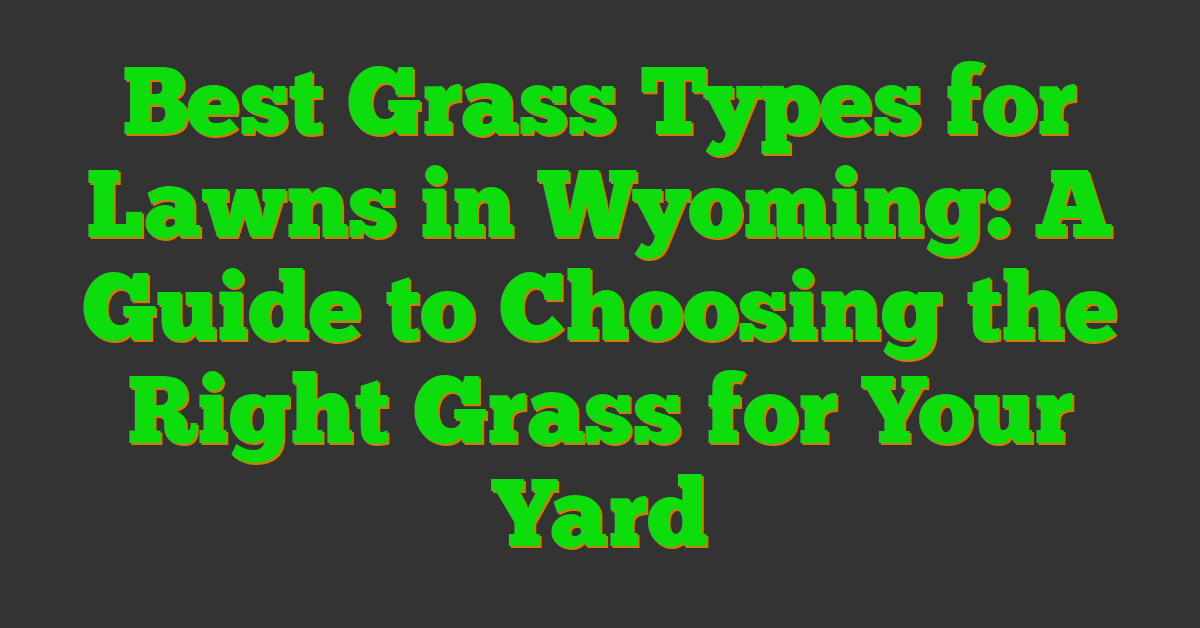Exploring Arizona’s diverse landscapes feels like uncovering a hidden treasure each time. From the sun-soaked deserts to the serene mountain ranges, the state is home to an incredible variety of plants that thrive in every corner.

In creating this Regional Plant Guide: Arizona Edition, I wanted to share the unique beauty and resilience of Arizona’s flora. Whether you’re a gardening novice or a seasoned botanist, this guide will help you connect with the plants that make Arizona so distinctive.
Join me on this botanical journey and discover the vibrant species that add life and color to Arizona’s stunning environments.
Overview of Regional Plant Guide: Arizona Edition
I designed this guide to showcase Arizona’s diverse plant life across its varied landscapes. Arizona features deserts, mountains, grasslands, and riparian zones, each supporting unique species. For instance, the Saguaro cactus thrives in the Sonoran Desert, while Ponderosa pines populate the mountainous regions. This guide includes over 100 plant species, categorized by their native environments. You’ll find detailed descriptions, growing conditions, and tips for cultivation. Whether you’re a gardening novice or a seasoned botanist, this guide helps you appreciate and cultivate Arizona’s resilient flora.
Key Features
- Desert Plants: Saguaro cactus, Barrel cactus, Ocotillo
- Mountain Flora: Ponderosa pine, Arizona white pine, Gambel oak
- Grassland Species: Blue grama, Buffalograss, Little bluestem
- Riparian Vegetation: Cottonwood, Willow, Arizona ash
Plant Categories
| Environment | Example Species | Adaptations |
|---|---|---|
| Desert | Saguaro cactus | Water storage, spines for shade |
| Mountain | Ponderosa pine | Deep root systems, needle retention |
| Grassland | Buffalograss | Drought resistance, low growth habit |
| Riparian | Cottonwood | Fast growth, large leaves for shade |
Explore each category to understand how these plants thrive in Arizona’s unique climates and terrains. This guide provides the knowledge you need to select and care for plants suited to your specific region within Arizona.
Key Features
My Regional Plant Guide for Arizona highlights the state’s diverse flora with organized and accessible information.
Comprehensive Plant Listings
The guide includes over 100 plant species, classified by their native environments:
| Environment | Number of Species |
|---|---|
| Desert | 30 |
| Mountain | 25 |
| Grassland | 20 |
| Riparian | 25 |
Each category provides detailed descriptions, growing conditions, and cultivation tips, enabling thorough understanding and successful cultivation of Arizona’s resilient plants.
User-Friendly Layout
Designed for ease of use, the guide features:
- Structured Categories: Plants grouped by their native environments.
- Detailed Index: Facilitates quick searching of specific species.
- Visual Enhancements: Includes images and diagrams for better comprehension.
This layout ensures you can efficiently navigate and utilize the guide to enhance your botanical knowledge and gardening efforts.
Benefits for Gardeners and Landscapers
Using the Regional Plant Guide: Arizona Edition offers numerous advantages for both gardeners and landscapers looking to thrive in Arizona’s unique environments.
Enhancing Plant Selection
I can easily choose from over 100 native plant species, ensuring selections match specific Arizona climates. The guide categorizes plants into 30 desert, 25 mountain, 20 grassland, and 25 riparian species, providing clear options for various garden types. For example, desert gardeners might select Saguaro cactus or Agave species, while those in riparian zones could opt for Cottonwood or Willow trees. Accurate descriptions and cultivation tips simplify the decision-making process, leading to healthier, more resilient gardens.
Sustainable Gardening Practices
Implementing eco-friendly methods becomes straightforward with the guide’s sustainable tips. I focus on water-efficient irrigation techniques and soil conservation strategies tailored to Arizona’s conditions. The guide recommends native plants that require minimal maintenance, reducing the need for chemical fertilizers and pesticides. Additionally, it highlights practices like mulching and composting, which enhance soil health and promote biodiversity. Adopting these practices not only conserves resources but also supports the local ecosystem.
Comparison with Other Regional Guides
Other regional plant guides often cover multiple states, limiting detailed information on specific environments. In contrast, my Arizona Edition focuses exclusively on Arizona’s unique landscapes, providing in-depth coverage of desert, mountain, grassland, and riparian species.
While many guides list native plants, mine categorizes over 100 species by their precise habitats. For example, typical guides might mention cacti generally, but my guide specifies the Saguaro cactus with detailed growing conditions and cultivation tips.
Numerous regional guides lack visual aids, yet my Arizona Edition includes high-quality images and diagrams for each species. This feature enhances plant identification and understanding, surpassing the basic text found in other guides.
A key difference lies in sustainability practices. Other guides may not address eco-friendly gardening, but mine offers water-efficient irrigation and soil conservation strategies tailored to Arizona’s climate. These practical tips support sustainable gardening and local ecosystem health more effectively.
| Feature | Arizona Edition | Other Regional Guides |
|---|---|---|
| Number of Species | 100+ native plants | 50-70 native plants |
| Habitat-Specific Categories | Yes (desert, mountain, etc.) | No, general listings |
| Visual Aids | High-quality images and diagrams | Limited or no visual aids |
| Sustainability Practices | Detailed eco-friendly tips | Minimal or no sustainability focus |
| User-Friendly Layout | Comprehensive index and categories | Basic organization |
By concentrating on Arizona’s distinct flora and providing comprehensive, habitat-specific information, my Regional Plant Guide offers a more valuable resource for gardeners and botanists seeking to cultivate and preserve Arizona’s natural beauty.
Pricing and Availability
I offer the Arizona Edition of the Regional Plant Guide in various formats to meet different needs and preferences. Below are the available options:
« Top Trends in Outdoor Living Spaces for Modern Backyards Caring for Plants in High Winds: Essential Tips to Protect Your Garden »
Pricing
| Format | Price (USD) | Features |
|---|---|---|
| Paperback | $29.99 | Durable cover, full-color images, comprehensive index |
| Hardcover | $49.99 | Premium binding, enhanced visuals, exclusive content |
| E-book | $19.99 | Instant download, searchable text, interactive diagrams |
| $15.99 | Printable version, compatible with multiple devices |
Availability
The guide is accessible through several channels to ensure easy access:
- Online Retailers: Available on Amazon, Barnes & Noble, and the official website.
- Local Bookstores: Stocked at major bookstores across Arizona, including Bookstore A and Bookstore B.
- Specialty Stores: Available in garden centers and botanical shops throughout the state.
- Digital Platforms: Accessible on Kindle, Apple Books, and Google Play Books.
Discounts and Bulk Purchases
I provide special discounts for bulk purchases, ideal for educational institutions, botanical gardens, and community groups:
- Educational Institutions: 15% off orders of 20 or more copies.
- Botanical Gardens: 10% discount for orders of 10–19 copies.
- Community Groups: 5% off for orders below 10 copies.
For bulk orders or custom pricing, contact me directly through the official website.
Conclusion
Exploring Arizona’s unique flora has been a rewarding experience. This guide has truly highlighted the incredible diversity that thrives across the state.
Whether you’re a seasoned gardener or just starting out, you’ll find the perfect plants to enhance your space. Embracing native species not only beautifies your garden but also supports the local ecosystem.
I’m excited to continue my journey with this valuable resource and hope it inspires you to cultivate your own vibrant Arizona garden.
















